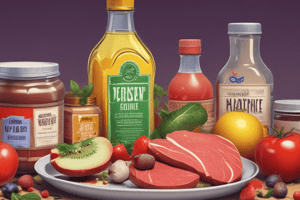Podcast
Questions and Answers
What chemical compound is linked to damaged DNA and cancer, prompting potential bans on Skittles?
What chemical compound is linked to damaged DNA and cancer, prompting potential bans on Skittles?
- Ractopamine
- Azodicarbonamide
- Titanium dioxide (correct)
- Tartrazine
Azodicarbonamide is known for being safe and is widely used in bread in European countries.
Azodicarbonamide is known for being safe and is widely used in bread in European countries.
False (B)
Which artificial dye is linked to hyperactivity and is present in products like Skittles and Mountain Dew?
Which artificial dye is linked to hyperactivity and is present in products like Skittles and Mountain Dew?
Yellow 5
Ractopamine is banned in 160 countries, including the EU, China, and __________.
Ractopamine is banned in 160 countries, including the EU, China, and __________.
Match the following products with their respective concerns regarding food safety:
Match the following products with their respective concerns regarding food safety:
What adverse effects can ractopamine cause?
What adverse effects can ractopamine cause?
Little Debbie Swiss Rolls can be found in the EU without any warning labels.
Little Debbie Swiss Rolls can be found in the EU without any warning labels.
In which country are both Skittles and Mountain Dew banned due to health concerns related to artificial dyes?
In which country are both Skittles and Mountain Dew banned due to health concerns related to artificial dyes?
Flashcards
Titanium Dioxide
Titanium Dioxide
A chemical compound linked to damaged DNA and cancer. It's banned in the EU, but not yet classified as toxic in the US.
Azodicarbonamide
Azodicarbonamide
A chemical that bleaches flour and strengthens dough. It's banned in many European countries due to concerns about its safety.
Ractopamine
Ractopamine
A growth hormone added to pork, banned in 160 countries, including the EU, China and Russia. Concerns exist about its safety for human consumption.
Chlorine Baths for Chicken
Chlorine Baths for Chicken
Signup and view all the flashcards
Tartrazine (Yellow 5)
Tartrazine (Yellow 5)
Signup and view all the flashcards
Yellow 5 and Red 40
Yellow 5 and Red 40
Signup and view all the flashcards
Special K
Special K
Signup and view all the flashcards
EU Food Regulations
EU Food Regulations
Signup and view all the flashcards
Study Notes
Skittles
- Skittles are banned in Sweden and Norway due to the use of Yellow 5 and Yellow 6 dyes, linked to hives and hyperactivity in children.
- The European Union is considering a ban on Skittles due to titanium dioxide, a chemical compound linked to damaged DNA and cancer.
- The FDA hasn't classified titanium dioxide as toxic, but a California lawsuit claims Skittles are toxic and unsafe for consumption.
- In 2021, the Environmental Working Group petitioned the FDA to classify titanium dioxide as toxic.
Bread
- Many European countries have banned azodicarbonamide in bread, a chemical used to bleach flour and strengthen dough.
- Azodicarbonamide is also used in industrial products, including yoga mats.
Pork
- The United States exports limited pork due to ractopamine, an additive banned in 160 countries (including the EU, China, and Russia).
- Ractopamine is considered unsafe for consumption, causing tachycardia, headaches, and muscle spasms.
Chicken
- The European Union opposes using chlorine baths to sanitize chicken, deeming it insufficient to address bacterial contamination and poor sanitation practices.
Mountain Dew
- Mountain Dew is banned in Austria and Norway due to tartrazine (Yellow 5), linked to headaches, hyperactivity, and other health concerns.
- A different European recipe exists, closer to the original formula.
Little Debbie Swiss Rolls
- Little Debbie Swiss Rolls are banned in Austria and Norway due to Yellow 5 and Red 40 dyes, possibly causing health problems in children.
- Studies suggest these dyes may cause ADHD, white blood cell damage, and tumor cell multiplication.
- EU sales include warning labels.
Special K
- Special K is banned in Denmark and discouraged in the EU due to high levels of vitamins and minerals, viewed as unnatural and potentially harmful.
- Special K is considered a GMO due to artificial vitamin A, zinc, and other compounds.
Steak Tartare
- Steak Tartare is banned in New Brunswick, Canada, due to COVID-19 food safety regulations.
Coca-Cola
- Coca-Cola is banned in North Korea and Cuba due to trade embargoes.
M&Ms
- M&Ms are banned in Sweden due to a trademark dispute with the Swedish candy Marabou, which uses similar lowercase "M" branding.
- Marabou, a Norwegian company, moved production to Sweden during WWI and received a royal appointment.
Studying That Suits You
Use AI to generate personalized quizzes and flashcards to suit your learning preferences.




